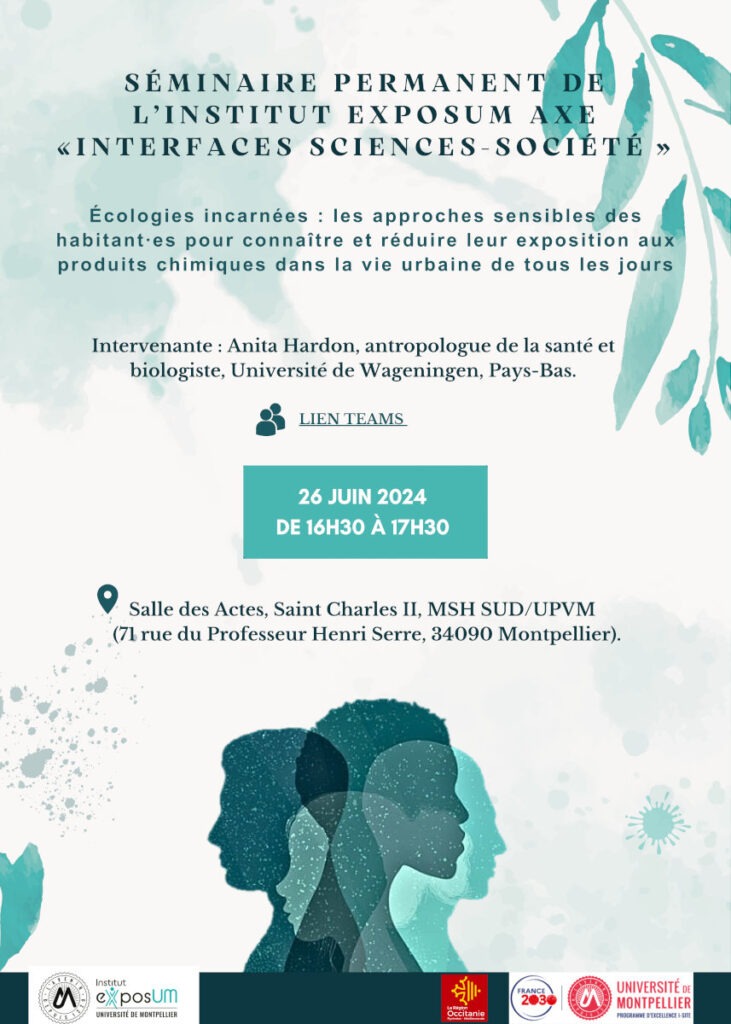Embodied ecologies: Sensitive approaches by residents to understanding and reducing their exposure to chemicals in everyday urban life
This event has passed!
The seminar presents the transdisciplinary project "Embodied Ecologies," based on citizen science, which enables people affected by chemical pollution to collect data for scientists and define research priorities. This project aims to study cumulative toxicities by combining ethnography and sensory mapping, and to promote practices to reduce the damage caused by these chemicals.
Speaker Anita Hardon will present key insights into how people feel, understand, and act to reduce their exposure to hazardous chemicals in urban environments in the Philippines, France, and the Netherlands. She will also discuss the challenges of measuring exposures and propose solutions for making the results usable.
The speaker, Dr. Anita Hardon, is a medical biologist and anthropologist who has conducted transdisciplinary studies on chemicals and pharmaceuticals, generating important ethnographic knowledge.

Embodied ecologies: Residents’ sensitive approaches to knowing and reducing their exposure to chemicals in everyday urban life
Chemicals enter and pass through our bodies via multiple pathways: the air we breathe, the water we drink, the work we do, the soil on which we live, play and grow our food, the food we eat, the building materials in our homes and the (personal) hygiene products we use, often without knowing what chemicals they contain. These toxic chemicals interact with each other, with organic matter in our environment and with our body’s own endogenous molecules. They are metabolized by our organs and excreted by our bodies in the form of chemical metabolites, which find their way into our waterways and affect the quality of our drinking water.
This presentation will introduce the transdisciplinary “Embodied Ecologies” project, based on citizen science, where people affected by chemical pollution not only gather data for scientists but also help define research priorities. This project aims to investigate the cumulative toxicities that can be experienced by combining ethnography and sensory mapping. It also aims to promote practices for reducing the harm to people associated with these chemicals.
Anita Hardon will evoke key insights into how people feel, know, and act to reduce their exposure to potentially hazardous chemicals in urban environments in the Philippines, France, and the Netherlands. She will go on to reflect on the challenges of measuring exposure using different techniques and suggest ways of making the results usable.
Speaker: Dr. Anita Hardon was trained as a medical biologist and anthropologist and has been engaged in transdisciplinary studies on synthetic chemicals and pharmaceuticals. Her research has generated important ethnographic insights into the use of these technologies in diverse social-cultural settings and their effects in everyday life. Anita Hardon is currently chair of the Knowledge, Technology, and Innovation group at Wageningen University and Research, and Professor of Anthropology of Care and Health at the University of Amsterdam. She has published widely disseminated articles, special issues, and books (Chemical Youth (an open access book), 2021 Palgrave Macmillan; Social Lives of Medicines, 2002 Cambridge University Press).
Receive a weekly summary of the UM agenda
* By entering your email address, you agree to receive a weekly summary of the UM calendar by email and acknowledge that you have read ourprivacy policy. You can unsubscribe at any time using the unsubscribe linkor by contacting us by email.
